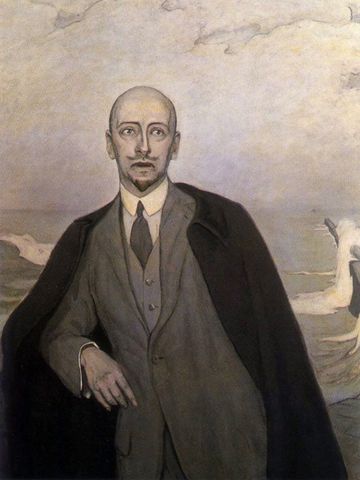Four Poems of Gabriele D’Annunzio
Translated from the Italian by
Michael Shindler (June 2019)

Gabriele D’Annunzio: The Poet as Exile, Romaine Brooks, 1912
Gabriele D’Annunzio could be described as an Italian nationalist, politician, and an eccentric literary artist. He was an officer and pilot of the First World War and later influenced Italian politics and literary culture to such a degree that Mussolini is said to have considered him a rival. Although his ideas were formative in the rise of Fascism, D’Annunzio’s popularity remains strong with multiple museums and public structures in Italy dedicated to his life and works.
Arcano!
In faith I hear a whisper in the trees,
a bitter odor billows toward my face;
but in the open azure there is not a breeze,
the peaks all sleep in a hazy light’s embrace.
Alike a veil of dreams it falls
in beams and into my vigil breaks;
a sweet languor within me sprawls…
My heart itself—it wakes!
In faith I hear a whisper in the air as it sweeps:
secrets sparkling from the waters unto the shore;
but the wind does not stir upon the deeps,
the poets’ mandolas play no more.
Io credo udir tra li alberi un susurro,
mi giunge in volto un’acre onda di odore;
ma vento non aleggia ne l’azzurro,
tutte dormon le cime entro il chiarore.
Come un velo di sogni, ecco, discende
a raggiar la mia veglia;
un languor dolce le vene mi prende…
È il mio cor che si sveglia!
Io credo udir ne l’aria bisbigliare
de l’acque a riva fulgidi segreti;
ma vento non aleggia sopra il mare,
tacciono le mandole de i poeti.
Un sogno
I hear not my step as the path unfurls,
hushed, by which the dream leads yet my sight.
Now is come the hour of silence and light.
And the sky seems a veil of pearls.
Each cypress skyward looms,
their dark points, still, with no sign of woe;
and yet they are sad—but not quite so
sad as are the cypresses of the tombs.
The countryside seems strange,
almost shapeless, sheltering a mystery
most ancient, whereby my scrutiny
loses itself in the hush of the path’s range.
I hear not my step. I’m the same
as a shadow; and my pains are a shadow;
indeed, all my life is but a shadow:
vague, uncertain, indistinct—without a name.
Io non odo i miei passi nel viale
muto per ove il Sogno mi conduce.
È l’ora del silenzio e de la luce.
Un velario di perle è il cielo, eguale.
Attingono i cipressi con oscure
punte quel cielo: immoti, senza pianto;
ma sono tristi, ma non sono tanto
tristi i cipressi de le sepolture.
Il paese d’in torno è sconosciuto,
quasi informe, abitato da un mistero
antichissimo, dove il mio pensiero
si perde, andando pe ‘l viale muto.
Io non odo i miei passi. Io sono come
un’ombra; il mio dolore è come un’ombra;
è tutta la mia vita come un’ombra
vaga, incerta, indistinta, senza nome.
Lascami! Lascia chio respiri
Leave me, leave me! Let me breath, let
me get up! In my veins I feel ice flowing.
I shudder. In my heart, I’ve some strange fret…
Ah, Lord—it’s the day! The day is coming!
Let me not look upon it! Press your lips
to my lashes, your heart to my heart!
Every field bleeds by love’s art.
And when they flood—life itself slips.
Full with frets I die, but not slain by you.
My chest drains itself, painlessly.
Is all this not blood? Oh, Lord—it’s dew!
The dawn, weeping, washes over me.
Lasciami! Lascia ch’io respiri, lascia
ch’io mi sollevi! Ho il gelo nelle vene.
Ho tremato. Ho nel cor non so che ambascia…
Ahimè, Signore, è il giorno! Il giorno viene!
Ch’io non lo veda! Premi la tua bocca
su’ miei cigli, il tuo cuore sul mio cuore!
Tutta l’erba s’insànguina d’amore.
La vita se ne va, quando trabocca.
Trafitta muoio, e non dalla tua spada.
Mi si vuota il mio petto, e senza schianto.
Non è sangue? Ahi, Signore, è la rugiada!
L’alba piange su me tutto il suo pianto.
La statua
Who’ll step down the high stair to the swans
who wait? They stretch up silently
their tall necks, ever and anon, and intently,
Glower through wild eyes of blackened bronze.
The waters within the circle of stone
swathed in mosses mock the wan rills’ spread.
A statue, a remembrance of long-dead
gods, amid the old cypresses stands alone.
What mystery from the gesture of a great
statue standing alone in a wildwood mid spring
silently sprawls as the hour grows late!
The sun is gone; but the Day—still bending
over the mountains, loosens a last flower from her plait.
And the sky seems now a higher and holier thing.
Chi scenderà da l’alta scala ai cigni
aspettanti? Protendono silenti
i lunghi colli, ad ora ad ora; e intenti
riguatano dai neri occhi ferigni.
Chiusa l’acqua nel cerchio dei macigni
muscosi ride ai bianchi solchi lenti.
Una statua, memore d’assenti
numi, grandeggia fra i cipressi insigni.
Qual mistero dal gesto d’una grande
statua solitaria in un giardino
silenzioso al vespero si spande!
Manca il sole; ma il Giorno, ancóra chino
su i monti, sfoglia l’ultime ghirlande.
E il cielo è più lontano e più divino.
«Previous Article Table of Contents Next Article»
__________________________________
Michael Shindler is a writer living in Washington, DC. His work has appeared in publications including The American Conservative, The American Spectator, National Review Online, HillRag, and Providence Magazine. Follow him on Twitter @MichaelShindler.
Follow NER on Twitter @NERIconoclast